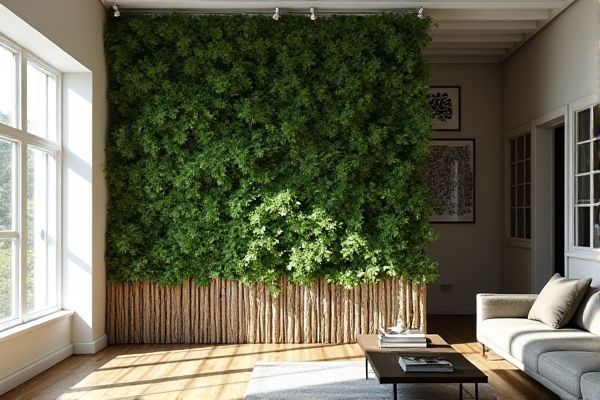
Faux ivy screens offer a low-maintenance, natural-looking privacy solution that mimics real greenery without the hassle of upkeep, while reed fences provide a more rustic, organic aesthetic with durable, weather-resistant qualities. Explore the rest of the article to discover which option best suits Your outdoor privacy and design needs.
Table of Comparison
| Feature | Faux Ivy Screen | Reed Fence |
|---|---|---|
| Material | UV-resistant plastic | Natural reed, bamboo stems |
| Durability | 5-10 years, weatherproof | 2-5 years, less weather-resistant |
| Appearance | Realistic green foliage, uniform look | Rustic, natural texture with natural variations |
| Privacy | High, dense coverage | Moderate, some gaps between reeds |
| Maintenance | Low, occasional cleaning | Moderate, may require replacement and cleaning |
| Installation | Easy, attach to fence or wall | Simple, tie or nail onto support structure |
| Cost | Moderate to High | Low to Moderate |
Introduction to Faux Ivy Screens and Reed Fences
Faux ivy screens offer a low-maintenance, realistic greenery alternative that enhances privacy and aesthetic appeal for your outdoor spaces. Reed fences are natural, lightweight barriers made from bundled reeds, providing a rustic look and effective wind screening. Both options serve as stylish, functional decorative solutions, with faux ivy excels in durability while reed fences emphasize organic charm.
Material Composition and Durability
Faux ivy screens are typically made from high-quality PVC or polyethylene, designed to mimic natural ivy leaves while offering resistance to UV rays, moisture, and temperature fluctuations, ensuring long-lasting durability with minimal maintenance. Reed fences use natural reed stalks bound together, providing an eco-friendly option but are more susceptible to weather damage, rotting, and insect infestation over time. The synthetic material of faux ivy screens generally outperforms reed fences in terms of lifespan and resilience against harsh environmental conditions.
Visual Appeal and Aesthetic Differences
Faux ivy screens offer a lush, dense greenery that mimics natural ivy, creating a vibrant and organic look perfect for enhancing your garden or patio privacy. Reed fences display a more rustic, natural texture with thin, vertical reeds bundled tightly together, providing a warm and earthy aesthetic. Choosing between the two depends on whether you prefer the leafy, lively appearance of faux ivy or the subtle, understated charm of reed fencing.
Installation Process Compared
The installation process of a faux ivy screen involves attaching lightweight panels or mesh to existing fences or walls using zip ties or hooks, offering a straightforward and quick setup suitable for DIY projects. In contrast, reed fences require securing natural reed bundles to horizontal support wires or frames, often demanding more time and skill to ensure even coverage and durability. Your choice depends on whether you prefer the fast installation and maintenance ease of faux ivy or the natural aesthetic and traditional assembly method of reed fencing.
Privacy and Coverage Effectiveness
Faux ivy screens provide dense foliage that effectively blocks sightlines, enhancing privacy with a natural, vibrant appearance that remains consistent year-round. Reed fences offer moderate privacy with their loosely woven reeds, allowing some light and visibility to pass through while creating a rustic aesthetic. The dense coverage of faux ivy is superior for full privacy, whereas reed fences prioritize ambiance and partial screening.
Maintenance and Upkeep Requirements
Faux ivy screens require minimal maintenance, needing occasional cleaning with a damp cloth to remove dust and debris, and they remain vibrant without watering or pruning. Reed fences demand more upkeep due to their natural material, requiring periodic sealing to prevent weather damage, pest control, and replacement of broken or rotting reeds. The synthetic nature of faux ivy screens offers a longer-lasting, low-maintenance solution compared to the organic, maintenance-intensive reed fences.
Weather Resistance and Longevity
Faux ivy screens, crafted from UV-resistant polyethylene, offer superior weather resistance by maintaining color and structure against sun, rain, and wind, typically lasting over 5 years without significant deterioration. Reed fences, made from natural reeds, are prone to moisture absorption, leading to mold, rot, and fragility that reduce their lifespan to approximately 2-3 years outdoors. The synthetic composition of faux ivy ensures enhanced durability and minimal maintenance, making it a longer-lasting choice compared to the organic reed material vulnerable to weather damage.
Environmental Impact and Sustainability
Faux ivy screens are typically made from synthetic materials like polyethylene or PVC, which involve plastic production and contribute to microplastic pollution, raising concerns over environmental impact and long-term sustainability. Reed fences, on the other hand, utilize natural, renewable materials harvested from wetlands, promoting biodegradability and minimizing carbon footprint through low-energy manufacturing processes. Choosing reed fences supports ecological balance and sustainable resource use, while faux ivy screens often prioritize durability and maintenance over environmental considerations.
Cost Comparison and Value for Money
Faux ivy screens typically cost more upfront than reed fences due to their synthetic materials and realistic appearance, but they offer greater durability and low maintenance, providing long-term savings. Reed fences are generally cheaper initially but may require frequent replacement or repairs, increasing overall expenses over time. Your choice depends on balancing initial budget constraints with the value of lasting performance and aesthetic appeal.
Choosing the Right Option for Your Space
Faux ivy screens offer a lush, green aesthetic with low maintenance, ideal for adding natural privacy and enhancing your outdoor ambiance year-round. Reed fences provide a rustic, organic look that blends well with garden settings but may require more upkeep and are less dense than synthetic alternatives. Your choice depends on whether you prioritize durability and fullness or a natural, breezy appearance to complement your space.
 homyna.com
homyna.com